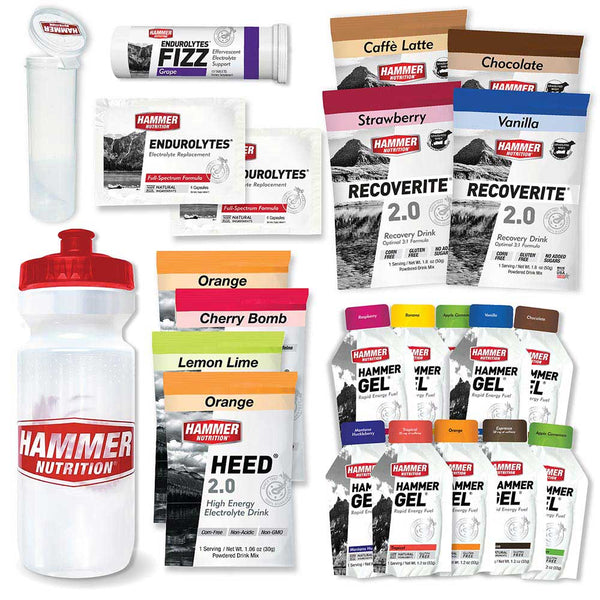
BY STEVE BORN
Over the past couple of years, there probably has not been any diet more widely adopted or hotly debated than the ketogenic diet. In issue #114 of Endurance News, I wrote an article titled “Five Reasons Why We’re Anti-Ketogenic Diet.” Since that time, there have been numerous proponents of this diet, with at least an equal number of detractors. For someone (me) who relishes research findings and details, these research-based pros and cons have been most interesting.
Before I go on further, I want to first say to athletes who have been following this particular diet for athletic performance gains and have obtained noticeable improvements in their workouts and races: far be it from me to detract from those results. And if you tried other methods to improve the quality of your workouts and enjoy better race results but didn’t succeed until you adopted the ketogenic diet, then I would certainly apply the “if it ain’t broke, don’t fix it” rule.
That said, I still believe this particular diet yields the majority of its benefits in weight loss and not as many in athletic performance. You will get arguments from both sides regarding the ketogenic diet’s efficacy and safety used long term—I tend to think that it’s not the healthiest diet around when it’s adhered to too strictly and/or for too long. As I mentioned in my article in EN #114, “In fact, a panel of health experts recently evaluated 40 diets for several factors, including ease of adherence, nutritional value, safety, effectiveness for weight loss, and protective benefits against diabetes and heart disease. Their rankings were published in U.S. News & World Report, and the ketogenic diet was ranked near the very bottom in a tie for 38th.”1
Still, what I have been noticing—albeit fairly casually—is that some people are enjoying weight loss by following this diet. However, I believe that once that goal is achieved via the application of this restrictive diet, a modified ketogenic diet is in order, both for enhancing athletic performance and for overall health. While acknowledging that Dr. Bayne French and I don’t necessarily see eye-to-eye on all aspects of the ketogenic diet, we very much agree on these points:
- Carbohydrate intake during exercise and immediately following is essential.
- A less-restrictive approach to the ketogenic diet (i.e., consuming more than 50 grams of carbs daily) will yield results.
Carbohydrate intake during/following exercise
I like to quote Dr. Rick Kattouf, who states, "Not only do carbohydrates provide energy for working muscles, they also assist in enabling fat metabolism. In short, carbohydrates need to be present for fat to be utilized for energy."2
Additionally, research has shown that when carbohydrate levels are low, a substance known as pyruvate—which is formed during glucose metabolism—is unable to perform its job in the process of creating energy using oxygen (i.e., cellular respiration). When pyruvate is unable to perform its tasks—which it can only do in the presence of carbohydrates—the body’s ability to use fat as a fuel source significantly slows down or halts altogether. This same research shows that without replenishment of adequate amounts of carbohydrates, the body will cannibalize specific amino acids (BCAAs, alanine) from muscle tissues, which not only slows down metabolism, but also causes excess production of fatigue-causing ammonia.3
Dr. French and I are both on the same page regarding carbohydrate intake and timing. We need carbohydrates to fuel our bodies during exercise and to permit the vast amounts of calories from fatty acid stores to be used efficiently as an energy source. I didn’t come up with the saying “Fat burns in a carbohydrate flame”, but I firmly believe it and have used it frequently when consulting with athletes.
I also firmly believe that we need carbohydrates following exercise—both immediately afterward and in the next couple of hours (at least)—to kick-start the recovery process. One important aspect of that process is the restoration and increase of muscle glycogen stores.
A less-restrictive approach to the ketogenic diet
I completely agree with Dr. French, who wrote in an article titled “Demystifying Keto” in Endurance News, issue #121: “People who avoid ALL of the common carb sources listed above are most likely eating less than 50 grams of carb per day. It’s an important place to be if your goal is to produce ketones. Being in this sub-50 club is considered very low carb and may not be sustainable for most endurance athletes. Eating ‘good carbs’ that put you in the low carb range of 50-150 grams per day is a good long-term strategy. Many find this to be the sweet spot for athletic performance, palatability, and sustainability. Ketones will still be made in these carb ranges, especially if you’re supplementing fat and ketones.”
Good Carbs
High-quality carbs provide a wide range of nutrients, including health-promoting plant chemicals called phytonutrients. Fiber helps to slow the digestion of sugars and starches, thus preventing large spikes in blood sugar and insulin associated with diabetes, heart disease, and weight gain.
- Broccoli
- Cauliflower
- Kale
- Brussels sprouts
- Strawberries
- Raspberries
- Blueberries
- Blackberries
- Walnuts
- Almonds
- Chia seeds
- Pecans
My take on carbohydrates and their restriction
Dr. French makes some strong points about carbohydrate intake on pages 18-21. My take on them is as follows:
- Carb intake is about timing, with pre-, during-, and post-exercise carbohydrate consumption (especially the latter two) being imperative for enjoying high-quality workouts and races, and for supporting enhanced recovery between.
- I believe the best way for athletes to enjoy the athletic performance benefits that the ketogenic diet appears to have is to modify it for a daily intake (aside from exercise) of 150-200 grams of carbohydrates.
- While taking into account the semi-lengthy time that full glycogen restoration requires, we need to be extremely mindful of carbohydrate intake throughout the day, especially high-glycemic-index carbs. We can’t just be unrestrained carboholics—the health issues associated with that are numerous and undeniable—and a 150-200-grams-per-day amount is doable for most athletes.
Final thoughts
I’ve never been a fan of dieting—at least not in the purest sense of the word—while training. Though I most certainly feel that being aware of what we eat in our daily diet is undeniably important—as we’re fond of saying, “the calories you consume always matter”—I feel that following a highly restrictive diet plan for any notable length of time is not compatible with athletic performance. To me, the training we do IS our way of dieting and maintaining our desired weight.
That said, while there may always be a healthy number of pros and cons regarding the ketogenic diet, a modified approach—permitting the intake of more grams of high-quality carbs, but not an unlimited amount, and certainly not “junk carbs” (processed foods, sugar, etc.)—may prove to be the key to both improved athletic performance and much better health.
References available upon request









10 comments
I am so impressed with your latest stance on Keto—as well as your list of “good” carbs. I know athletes who are heavily into Keto AND Intermittent Fasting. Yikes! What a combo! I am relieved to see an intelligent article willing to buck the current fad.
———
Hammer Nutrition replied:
Hello Debra, Thank you for your comments, they lead to our next step and series of discussions. Endurance athletes need carbs while they exercise – some, not a ton. Trying to do marathons, IM’s, 100 mile trail races on protein and fat alone is no fun and a bad idea for many reasons. On the other end of the spectrum, we have a new crop of high calorie jokers running around talking about 90 + grams of carbs per hour. Going forward, the idea is to separate fueling practices with dietary practices – practice IF on the days it works for your schedule and modify as needed so you have calories onboard while exercising, on the days you exercise. Stay tuned for more on all of the above! BDF
The answer is still unknown. Some things to think about. Studies, who pays for them. They typically get the results they want. Dr Stephen Phinney back in the 1980’s wanted to study this. Just recently the funding has shown up. Michelle Hurn is a good example. Her Book The Dietitian’s Dilemma is a worthwhile read on this subject. Evidence is what we need.
———
Hammer Nutrition replied:
Hi Stan, Thank you for your comments. I wholeheartedly agree with you about studies – A good place to start is all of the research that pointed the finger at fat and cholesterol as the source of the #1 killer in America, heart disease, when it fact it was sugar. Add it as a primary contributing factor in all other diseases that plague us today = I see evidence everywhere. My goal for over three decades has been to help athletes and anyone else that will listen realize the insidious nature of this extremely addictive, ubiquitous substance and provide an alternative to the sugar/salt/citric acid paradigm for fueling. The high fat/protein, low carb approach to eating (I don’t like labels and won’t call it keto because it’s not), with or without Intermittent Fasting (another label I’d prefer avoid and will be increasingly referring to it as “compressed eating window", has been the most effective eating style for me and so many others in getting off of the sugar/carb merry go round. BDF
Is Keto, besides losing weight, for some, just reminding us that most people regardless of their athletic participation just not getting enough protein in their diet?
Protein, carbs and good fats are essentials. There really are only about 150 foods to eat. Nutrition is foremost. Enjoying food is second. Eating healthy is hard.
But let us face the truth, most certified nutritionist are not well educated when it comes to athletes. Their certification for me is null and void. The FDA is full of FAT.
———
Hammer Nutrition replied:
Hi Craig, Thank you for your comments and questions. I’d say the goal of these articles is to move away from an inaccurate label (keto diet) in favor of a diet that relies more on fat and protein (animal, plant or a combination) and less on sugar/grains and starches. Another goal of mine is to help people see eating clean/healthy food can be delicious, fun and relatively easy. Stay tuned! BDF
People who are committed to counting carb intake should probably eat a varying number of CHO * day^1 rather than a blanket amount of <50 g or between 150-200 g. They’ve shown they’re caring enough to count in the first place, so they’re likely motivated to go one step further. On easy days or rest days they simply are not using enough glycogen nor catabolizing enough protein for increased CHO to matter, so the low end might suffice. Consume more on longer and/or more intense days. Also, for average athletes, a lower amount might be fine for recovery because while the research does support CHO soon after exercise for glycogen replacement; the other parts of the data are ignored, namely that if one is not exercising intensely again within 24 hours (most people) then diet composition really doesn’t matter much. The body will repack the glycogen it needs; the “magic window” only applies to narrow situations.
Also, I’m neither a keto proponent nor opponent. I stand by quality over quantity regardless of the macro composition.
———
Hammer Nutrition replied:
Hello Brian, Thank you for your learned comments, I heartily concur. I would add that there is also a very, very limited number of people who need to or should eat hard core keto (less than 50 grams, 2 ounces of total carb intake per day) and they are not endurance athletes wanting to train 10-12 hours per week or more. BDF
Steve
Great article and agree with you 100%. I don’t know how anyone performs at a high level on 50 gr of carbs per day. Reading it brought back some memories of my Exercise Physiology classes in college. As I was reading it I was thinking of one of my professors lecturing us that fats always burn in the flame of carbohydrates. After I read you say the same thing I smiled to myself!
Rob